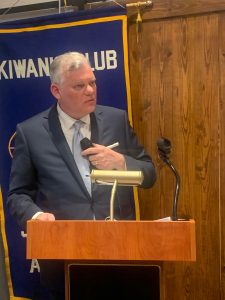Prosecutor Keith Chrestman talks first 100 days in office; WM3’s Echols asks for more evidence to be tested
by April 28, 2021 4:53 pm 7,063 views

When Keith Chrestman was a child, he was fascinated by the television sitcom “Different Strokes” and honed in on one character in particular, the father in the series Mr. Drummond, played by the actor Conrad Bain.
Chrestman, a West Memphis native, thought the wealthy father was a lawyer and he admired him so much that he made it his life goal to become one. There was only one slight problem, he told Talk Business & Politics.
“Well it (his career) started off as a lie,” he said with a smile. “I thought he was a lawyer, but he wasn’t.”
Mr. Drummond was a wealthy businessman.
A 1996 graduate of the University of Arkansas School of Law, Chrestman was appointed by Gov. Asa Hutchinson to fill the final two years of former Second Judicial District Prosecutor Scott Ellington’s term. Ellington was elected to a judgeship in November 2020.
Chrestman spoke about at the Jonesboro Kiwanis Club meeting Wednesday (April 28).
During his first 100 days, Chrestman said he has spent his time appointing deputy prosecutors and others to new roles. Team building has been the theme of his early endeavors. The two counties in the district with the most felony cases are Craighead and Crittenden. He appointed Charlene Henry as the lead prosecutor in Craighead County.

Chrestman was in private practice for several years, served as a deputy during Ellington’s tenure and was even appointed last year as a circuit court judge.
One of the bigger challenges his office faces right now is the backlog of cases due to the COVID-19 pandemic. Jury trials were suspended by the Arkansas Supreme Court last year and it made the typically slow process of justice even slower, he said.
Since he took office, his deputy prosecutors have been able to reach at least 1,500 plea deals in pending felony criminal cases. Criminal and civil courts are slated to re-start in May so it was vital that cases that could be adjudicated without a jury trial be resolved. They’ve also pushed to have some of the time normally reserved for civil cases to be transferred to criminal case time.
“I’m very proud of the work they have been doing,” he said of his deputy prosecutors and staff.
Another change he made was to eliminate the hot check program. Businesses that received hot checks used to be able to bring them to the prosecutor’s office, and if the office was able to acquire a payment it received a percentage.
In years past, the program generated money for the office, but now technology and check cashing standards have greatly reduced the number of hot checks to the point that maintaining the program was not cost effective, he added.
One case that has haunted the district and the office for almost 30 years – the West Memphis Three case – still has had relevance since he took office, Chrestman said.
Three Marion teens – Damien Echols, Jason Baldwin, and Jessie Misskelley Jr. – were convicted in the deaths of three eight-year old boys, Stevie Branch, Christopher Byers and Michael Moore. The killings happened May 5, 1993 in West Memphis.
The defendants were released in 2011 after agreeing to an Alford plea. The plea was made after a slew of evidence surfaced through the years that contradicted much of the prosecution’s original case and raised serious questions as to whether other parties were culpable in the boys’ deaths.
Echols, the alleged ringleader, has asked Chrestman’s office to test remaining items of evidence in the case, but much of it is gone, the prosecutor said. In capital murder cases, evidence is kept and securely stored, but in cases like this the evidence is often destroyed or lost.
Chrestman said he told Echols’ attorneys that if they wanted that evidence tested they would have to seek a court order.
It’s his understanding that state law won’t allow him to seek the office he now holds since he was appointed and that’s fine with him, he said. Last year, he was hesitant to take the circuit court judge position due to the fact that he liked writing legal opinions while working in private practice. He got to do some legal writing as a judge and will get to do some as a prosecutor.
How does he like his job to this point?
“I think we’ve had a productive 100 days … I’m looking forward to the next two years,” he said.
